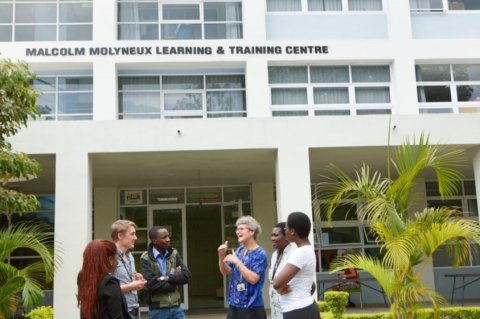In Memoriam: Malcolm Molyneux
Chief Executive Tamar Ghosh writes about the achievements of long-standing Fellow and former Trustee, Professor Malcolm Molyneux.

We are so very sad to announce that our long-standing Fellow and former Trustee, Professor Malcolm Molyneux OBE FmedSci Dsc died last week.
Malcolm was an inspiration to the team and Board at RSTMH, and I’m sure many of you had the pleasure of knowing and working with him over the years in Malawi or Liverpool.
Malcolm joined the society as a Fellow in 1976, and was awarded the Sir Rickard Christophers Medal in 2009. I personally met Malcolm for the first time at our Topics in Infection event in 2017 and, as happens with many of the great individuals in our sector, the memory of that first meeting has stayed strong. He instantly made me feel welcome as a new contact, with his warmth and good humour. His knowledge and interest in his work and in the Society was infectious and this quickly turned into commitment to use his vast experience and skills to help the society more.
Once returned to the UK he joined the Board of Trustees in 2017 and was also a valuable member of the Meetings and Events and Grants and Awards Committees. Dedicated, highly skilled, compassionate and good humoured are just some of the ways I would describe working with him during this time. I welcomed the chance to catch up with him whenever there was an opportunity.
From his colleagues
President of RSTMH, Professor Janet Hemingway CBE said of Malcolm: “As Director of LSTM I was delighted to see the fantastic job Malcolm had done in establishing and running the MLW centre in Malawi. He and his wife Liz were well integrated into the local community and obviously loved and respected. His wicked sense of humour, energy and quiet words of wisdom will be missed by his friends and colleagues around the world.”
Vice-President of RSTMH, Professor David Mabey shared: “Malcolm made a huge contribution to tropical medicine and global health through his research, teaching, mentorship and capacity building in Malawi and worldwide. Whether it was on the squash court, the lecture theatre, the exam board or at committee meetings, I always looked forward to seeing Malcolm and to hearing his words of wisdom. He was an inspiration to many of us and will be greatly missed.”
RSTMH Trustee, Professor Bridget Wills described Malcolm as “a caring and compassionate clinician with a remarkable mind who dedicated his life to improving the health of the most disadvantaged, but also a warm and funny man with a wicked sense of humour who inspired and encouraged me and many others to develop a career in tropical medicine – he will be greatly missed by all those whose lives he touched.”
RSTMH Trustee and Chair of the Grants and Awards Committee, Professor Jimmy Whitworth shared: “So sorry to hear that Malcolm has died. Whether in Liverpool, Blantyre or elsewhere it was always a pleasure to meet up with Malcolm. Such a kind, humorous and gentle man. I will miss him very much.”
From the perspective of our team I think these words from former Digital Comms Manager, Sarah Marzouk, sums up all of our thoughts: “Malcolm always took the time to talk to and get to know everyone in the RSTMH team. I will remember our chats very fondly. He was a genuinely kind and humble person and will be greatly missed.”
It is lovely and fitting to note that every member of the team was, like me, able to recount the first time they met Malcolm, which was often at an RSTMH event. We will miss him greatly, and felt honoured to know him.
Malcolm’s achievements

An obituary about Malcolm’s incredible achievements will feature in one of our journals soon, however in the meantime we are sharing here an excerpt from the piece written by LSTM, where he worked in recent years:
Born in what is now the Democratic Republic of Congo (DRC) in 1943, he was sent to boarding school at Eltham College, London. He then read natural sciences at St Catherine’s College, Cambridge before taking up his clinical training at St Bartholomew’s Medical School. It was there where he met his future wife, Elizabeth Neech. They both qualified in 1968 and married the following year.
Malcolm Molyneux’s first encounter with Malawi was as a medical student. He visited Malawi briefly at the end of his elective in Durban, South Africa. After specialising in internal medicine, he and his family moved to Malawi where he was transferred from a small mission hospital in Malosa to the main government hospital in Blantyre because there was no medical specialist present at the time.
From 1975 to 1984 Malcolm Molyneux practiced as a specialist at Queen Elizabeth Central Hospital, Blantyre. Despite busy professional and family lives, he completed his Doctor of Medicine thesis on viral determinants of acute and chronic liver disease in Malawi.
Malcolm Molyneux’s relationship with LSTM began in 1984 when, upon returning to the UK from Malawi and after some persuasion by the late LSTM Dean Professor Herbert Gilles, he took up the post of senior lecturer – focusing on malaria.
With that appointment started a lifelong fascination with the disease, with a particular focus on making malaria research relevant to clinical practice and promote the training of Malawian clinicians and scientists.
In 1986, together with Dr Terrie Taylor, he sourced funds to create a research ward sited adjacent to the children’s department of the Queen Elizabeth Central Hospital. This was opened in 1990 and from then until 1994 the research was funded jointly through the Wellcome Trust and the US National Institutes of Health. Over this period, Malcolm was invited by the government of Malawi to serve on the Advisory Panel to establish the College of Medicine which is part of the University of Malawi. This opened in 1991.
In 1993 the Wellcome Trust put out a call for institutions to submit proposals to establish research centres in tropical medicine. Malcolm Molyneux and Professor Peter Winstanley, from the University of Liverpool, in collaborative partnership with the newly established College of Medicine at the University of Malawi submitted a proposal. The proposal was accepted in early 1994 and, later that year, the Wellcome Trust Tropical Centre was established in Liverpool. In 1995 the Molyneux family returned to Malawi in order to establish a research laboratory and the Malawi-Liverpool Wellcome (MLW) programme. His wife, Professor Elizabeth Molyneux, formerly of Alder Hey Children's Hospital, won acclaim for her care of children in Malawi.
As Director, Malcolm always energetically supported training opportunities for Malawian clinicians and scientists. In this and other ways Malcolm Molyneux mentored and promoted Malawian researchers in the college. This has been a major contribution that has enhanced the reputation of the college as a training and research institution of excellence. As a result, the new learning and training centre on campus was named after him.
He was Editor of 'Tropical Doctor', 'Malawi Medical Journal' and its forerunner ‘Medical Quarterly’; and served on committees of the Malaria Control Programme in Malawi, the World Health Organization, and various components of GSK’s candidate malaria vaccine RTS,S.
He was also the Ombudsman for The Lancet. He and his wife Liz, a consultant paediatrician, were both awarded the OBE by the Queen in 2006. They returned from Malawi to live in Liverpool in December 2015, from where they continued to support and collaborate in research and training in Malawi and other low-income countries.
Malcolm was awarded an Honorary Doctor of Science degree by LSTM in December 2019.
Service
There will be a funeral service for Malcolm on the 13th December at 10am in the Lady Chapel of the Anglican Cathedral, Liverpool.
We are grateful to Elizabeth, Malcolm’s wife, for letting us know about this, and being able to pass this onto others. We send her and others in Malcolm’s family our love and warm wishes.
Find more details about the service here: